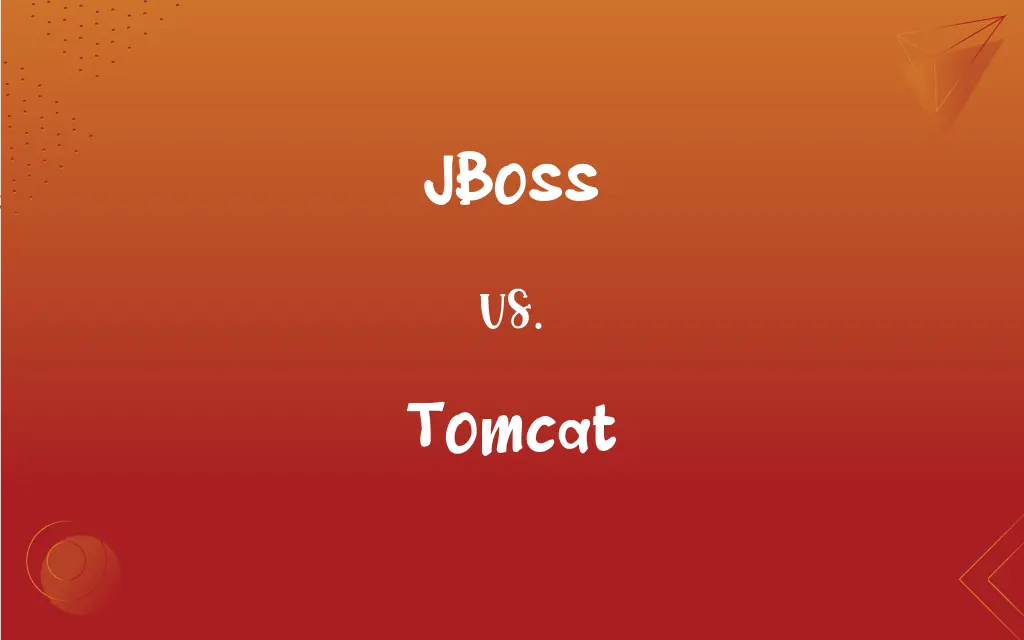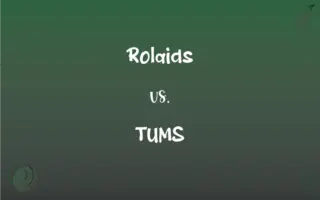JBoss vs. Tomcat: What's the Difference?
Edited by Aimie Carlson || By Janet White || Published on February 3, 2024
JBoss is a full Java EE application server, offering a broad range of Java services, while Tomcat is a servlet container and web server for Java applications, more lightweight and specific in its functionality.

Key Differences
JBoss is a comprehensive Java EE application server used for building, deploying, and hosting enterprise-level Java applications. Tomcat, however, is a more lightweight and focused web server and servlet container used for running Java-based web applications.
JBoss offers a wide array of Java EE features and services, including EJB support, making it suitable for complex, large-scale enterprise applications. Tomcat is primarily used for serving web pages using Java servlets and JSPs, ideal for simpler web applications.
JBoss provides full support for Java EE and its various specifications, offering robust enterprise services. In contrast, Tomcat is a part of the Apache Software Foundation and primarily focuses on Java Servlet and JSP technologies.
In terms of performance and resource utilization, JBoss, being a full-fledged application server, requires more resources and is more complex. Tomcat, being a servlet container, is lighter and faster, suitable for applications not requiring full Java EE support.
JBoss is often chosen for its comprehensive support for transaction management, messaging, and security in enterprise applications. Tomcat, with its simplicity and speed, is preferred for web applications that don't require such extensive enterprise functionality.
ADVERTISEMENT
Comparison Chart
Type
Full Java EE application server
Servlet container and web server
Primary Use
Enterprise-level Java applications
Java-based web applications
Java EE Support
Full support for Java EE specifications
Limited to Java Servlet and JSP technologies
Complexity and Resources
More complex, higher resource requirements
Lighter, faster, and requires fewer resources
Ideal Application Scenario
Complex enterprise applications
Simpler web applications
ADVERTISEMENT
JBoss and Tomcat Definitions
JBoss
JBoss is a Java EE application server for deploying enterprise applications.
Our company uses JBoss for its critical business applications.
Tomcat
Tomcat is ideal for simpler web applications.
Our small-scale web app runs smoothly on Tomcat.
JBoss
JBoss offers a wide range of Java services and support for complex applications.
JBoss's support for EJB makes it ideal for our needs.
Tomcat
Tomcat is part of the Apache Software Foundation.
Tomcat, being an Apache project, has a strong community support.
JBoss
JBoss provides extensive support for security and messaging.
JBoss's advanced security features protect our application data effectively.
Tomcat
Tomcat specializes in Java Servlet and JSP technologies.
Tomcat efficiently handles our website's Java servlets.
JBoss
JBoss is used in environments requiring full Java EE stack.
Our enterprise application on JBoss integrates various Java EE services seamlessly.
Tomcat
Tomcat is a web server and servlet container for Java applications.
We deployed our web application on Tomcat for its lightweight nature.
JBoss
JBoss is known for its comprehensive enterprise solutions.
We chose JBoss for its robust transaction management capabilities.
Tomcat
Tomcat is known for its speed and efficiency in web environments.
We prefer Tomcat for its fast response times for our web users.
FAQs
What makes Tomcat different from JBoss?
Tomcat is a servlet container and web server, focused on Java Servlet and JSP technologies.
Can JBoss handle high-traffic applications?
Yes, JBoss is designed to manage complex and high-traffic enterprise applications.
What is JBoss primarily used for?
JBoss is used for building and deploying enterprise-level Java applications.
Is Tomcat easy to set up and use?
Yes, Tomcat is known for its ease of use and simple setup.
Is JBoss resource-intensive?
Yes, JBoss generally requires more resources due to its wide range of features.
How does Tomcat perform in terms of speed?
Tomcat is known for its fast performance, especially for web applications.
Can JBoss be used for web applications?
Yes, though it's more than necessary for simple web applications.
Does JBoss support full Java EE?
Yes, JBoss provides full support for Java EE specifications.
Is Tomcat suitable for large enterprise applications?
Tomcat is better suited for simpler web applications, not requiring full Java EE features.
Is JBoss good for startups?
It depends on the complexity and needs of the startup's applications.
Is Tomcat a part of the Java EE specification?
Tomcat itself is not a full Java EE server but supports servlet and JSP specs.
What is the licensing model for JBoss?
JBoss has various licensing options, including open-source and enterprise versions.
Does JBoss offer messaging services?
Yes, JBoss provides robust messaging services.
How does Tomcat integrate with other Apache projects?
Tomcat integrates well with various Apache projects, benefiting from the ecosystem.
Does JBoss offer transaction management?
Yes, JBoss provides comprehensive support for transaction management.
Can I use Tomcat for a small business website?
Absolutely, Tomcat is ideal for small to medium-sized web applications.
What type of applications is Tomcat not suitable for?
Tomcat is less suitable for applications requiring full Java EE stack.
How is the community support for Tomcat?
Tomcat has strong community support, being part of the Apache Software Foundation.
Are there any scalability concerns with JBoss?
JBoss is highly scalable, suitable for growing enterprise applications.
Can Tomcat handle enterprise security needs?
While Tomcat has security features, JBoss has more advanced enterprise security capabilities.
About Author
Written by
Janet WhiteJanet White has been an esteemed writer and blogger for Difference Wiki. Holding a Master's degree in Science and Medical Journalism from the prestigious Boston University, she has consistently demonstrated her expertise and passion for her field. When she's not immersed in her work, Janet relishes her time exercising, delving into a good book, and cherishing moments with friends and family.
Edited by
Aimie CarlsonAimie Carlson, holding a master's degree in English literature, is a fervent English language enthusiast. She lends her writing talents to Difference Wiki, a prominent website that specializes in comparisons, offering readers insightful analyses that both captivate and inform.































































